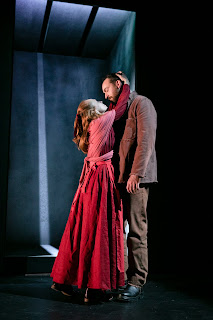 |
| Hayley McElhinney and Michael Abercrombie (pic: Daniel J Grant) |
20 August – 3 September
A play that begins with a family huddling by fitful candlelight
in a freezing Cornwall hovel in the early years of the Industrial Age and ends, approaching
two centuries later, in the same house by the light and warmth of a device
powered by an element mined from the surface of the moon by a Chinese
conglomerate, needs to have a lot going for it.
Oil, by the British playwright Ella Hickson, certainly does; it’s audacious,
epic, polemically devastating, dialectically thorough and engaging.
And if it sacrifices a little of its greatest strength for a less convincing
one, that’s a small price to pay.
In any event, the quality of this Black Swan production’s direction (by Adam
Mitchell, design (by Zoë Atkinson) and performances is so fine that qualms
about the balance of the text’s strengths and weaknesses should and will matter
little to its audience.
Oil is the story of one woman, May (Hayley McElhinney), who, in Kurt Vonnegut’s
memorable phrase, has “become unstuck in time” – specifically, the Time of Oil –
from 1858 in Cornwall to Tehran in 1908, oil-shocked London in 1970, war-torn Iraq
in 2025 and, finally, back in Cornwall in 2051.
She is the same woman, at different ages, and her daughter, Amy (Abbey Morgan)
is the same girl.
May, pregnant with Amy, flees her pitiful existence the night her
family rejects an offer to sell their farm to an executive from an American
kerosene company (Will Bastow). She deserts her husband, Joss (Michael
Abercrombie, a massive presence yet again) who she loves with deep, emotional
sexuality, whose loss she will mourn all her life.
She next appears in domestic servitude in Tehran with the young Amy, as the
European powers jostle for control of the Middle East’s seemingly boundless oil
reserves.
In 1970, May is the CEO of a British oil company operating in Libya when Colonel
Gadhafi “negotiates” the nationalisation of its operation, while Amy, now 15,
claims a sovereignty of her own.
In the war-torn Iraqi desert of the near future, May, now a former MP, pleads
with Amy, now an environmental activist, to escape as the oilfields burn as battle
rages around them.
Finally, as the petroleum splutters to its end, May, now old and cared for by
Amy, returns to where it began, cold, caught in the ruin of the life we have
lived and resisting the dawn of a new age.
McElhinney is magnificent in this fertile, hybrid role, inhabiting its dramatic
changes without losing its personality; she is determined, stern by necessity,
vulnerable and needy, sometimes all at once.
As a young single
mother in Teheran she juggles the overtures of her superior Mr Thomas (St John Cowcher)
and the louche, treacherous British agent Officer Samuel (Will O’Mahony). Later, in the play’s outstanding scene she is Thatcherite as she spars with the Libyan
envoy Mr Farouk (the incredible Tinashe Mangwana) over the rightful ownership
of his country’s oil, the legacy of colonialism and reality of post-colonialism.
The world changes, but May, in McElhinney’s hands, is eternal.
The cast, which also includes Violette Ayad, Grace Chow and the eminent actor
and dramaturg Polly Low has been expertly assembled and give fine supporting
performances.
If I have a reservation, it’s hardly more than a technicality. The parallel
story of May and Amy, the protective mother and – versus – the headstrong girl
is cogent and well-founded (Morgan impressively inhabits changes in Amy
that are even more sweeping than those of May), but it doesn’t sit in the
balance of the narrative as securely as the wider historic dimensions of the
play do. Where Farouk and May’s battle of wit and will is mesmerising and expository,
May and Amy’s seem repetitive and overcooked.
But Mitchell’s management of the story, and the stage, is too meticulous and focused to let this disrupt the impetus of the work, and Atkinson’s design,
with its shifting rectangles in sharp black frames gives the action a cinematic
quality that is endlessly inventive and absorbing (Oil must surely one day be
adapted as a long-form television series, though I doubt it could better the
original).
There’s similar care and focus in Matthew Marshall’s lighting and
Melanie Robinson’s sound design, notably a low, subterranean growl that could
be an oil well about to blow or tanks advancing on a sleeping town.
The final and most important quality an epic story like Oil must have is
pressing contemporary relevance. As places like the UK prepare for a
miserable, perhaps fatal, winter, as embargoes cripple the world's economic
structures and tanks rumble again across the old killing fields of the East
European Plain and ships sail unhindered across the Northwest Passage, that is
a task, a duty, it fulfills.The audience may not have been humming Midnight
Oil’s Beds are Burning as it played them out of the theatre, but they won’t
have easily got it out of their heads.
Oil runs at The Heath Ledger Theatre until November 27